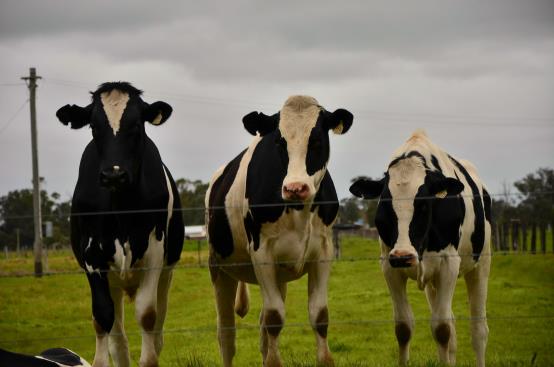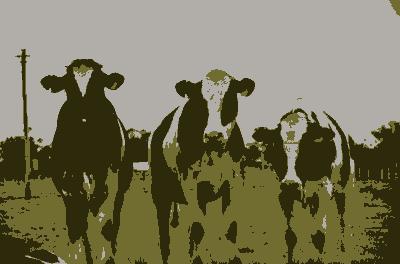k-means处理图片
Posted 段子手实习生
tags:
篇首语:本文由小常识网(cha138.com)小编为大家整理,主要介绍了k-means处理图片相关的知识,希望对你有一定的参考价值。
问题描述:把给定图片,用图片中最主要的三种颜色来表示该图片
k-means思想:
1、选择k个点作为初始中心
2、将每个点指派到最近的中心,形成k个簇cluster
3、重新计算每个簇的中心
4、如果簇中心发生明显变化或未达到最大迭代次数,则回到step2
问题:初始点不对的时候,容易收敛到局部最优值
解决办法:
1、选择k个点作为初始中心——canopy,模拟退火,贝叶斯准则
2、将每个点指派到最近的中心,形成k个簇cluster
3、重新计算每个簇的中心
4、如果簇中心发生了明显的变化或未达到最大迭代次数,则回到step2
例子:给你一幅图像,找出其中最主要的三种颜色,并将图片用三种最主要的颜色表示出来
# -*- coding: utf-8 -*- # https://github.com/ZeevG/python-dominant-image-colour # commented by heibanke from PIL import Image import random import numpy class Cluster(object): """ pixels: 主要颜色所依据的像素点 centroid: 主要颜色的RGB值 """ def __init__(self): self.pixels = [] self.centroid = None #cluster有两个属性,centroid表示聚类中心,pixels表示依附于该聚类中心的那些像素点 #每个聚类中心都是一个单独的Cluster对象 def addPoint(self, pixel): self.pixels.append(pixel) def setNewCentroid(self): """ 通过pixels均值重新计算主要颜色 """ R = [colour[0] for colour in self.pixels] G = [colour[1] for colour in self.pixels] B = [colour[2] for colour in self.pixels] R = sum(R) / len(R) G = sum(G) / len(G) B = sum(B) / len(B) self.centroid = (R, G, B) self.pixels = [] return self.centroid class Kmeans(object): def __init__(self, k=3, max_iterations=5, min_distance=5.0, size=400): """ k: 主要颜色的分类个数 max_iterations: 最大迭代次数 min_distance: 当新的颜色和老颜色的距离小于该最小距离时,提前终止迭代 size: 用于计算的图像大小 """ self.k = k self.max_iterations = max_iterations self.min_distance = min_distance self.size = (size, size) def run(self, image): self.image = image #生成缩略图,节省运算量 self.image.thumbnail(self.size) self.pixels = numpy.array(image.getdata(), dtype=numpy.uint8) self.clusters = [None]*self.k self.oldClusters = None #在图像中随机选择k个像素作为初始主要颜色 randomPixels = random.sample(self.pixels, self.k) for idx in range(self.k): self.clusters[idx] = Cluster()#生成idx个Cluster的对象 self.clusters[idx].centroid = randomPixels[idx]#每个centroid是随机采样得到的 iterations = 0 #开始迭代 while self.shouldExit(iterations) is False: self.oldClusters= [cluster.centroid for cluster in self.clusters] print iterations #对pixel和self.clusters中的主要颜色分别计算距离,将pixel加入到离它最近的主要颜色所在的cluster中 for pixel in self.pixels: self.assignClusters(pixel) #对每个cluster中的pixels,重新计算新的主要颜色 for cluster in self.clusters: cluster.setNewCentroid() iterations += 1 return [cluster.centroid for cluster in self.clusters] def assignClusters(self, pixel): shortest = float(\'Inf\') for cluster in self.clusters: distance = self.calcDistance(cluster.centroid, pixel) if distance < shortest: shortest = distance nearest = cluster#nearest实际上是cluster的引用,不是复制 nearest.addPoint(pixel) def calcDistance(self, a, b): result = numpy.sqrt(sum((a - b) ** 2)) return result def shouldExit(self, iterations): if self.oldClusters is None: return False #计算新的中心和老的中心之间的距离 for idx in range(self.k): dist = self.calcDistance( numpy.array(self.clusters[idx].centroid), numpy.array(self.oldClusters[idx]) ) if dist < self.min_distance: return True if iterations <= self.max_iterations: return False return True # The remaining methods are used for debugging def showImage(self): """ 显示原始图像 """ self.image.show() def showCentroidColours(self): """ 显示主要颜色 """ for cluster in self.clusters: image = Image.new("RGB", (200, 200), cluster.centroid) image.show() def showClustering(self): """ 将原始图像的像素完全替换为主要颜色后的效果 """ localPixels = [None] * len(self.image.getdata()) #enumerate用于既需要遍历元素下边也需要得到元素值的情况,用for循环比较麻烦 for idx, pixel in enumerate(self.pixels): shortest = float(\'Inf\') #正无穷 for cluster in self.clusters: distance = self.calcDistance( cluster.centroid, pixel ) if distance < shortest: shortest = distance nearest = cluster localPixels[idx] = nearest.centroid w, h = self.image.size localPixels = numpy.asarray(localPixels)\\ .astype(\'uint8\')\\ .reshape((h, w, 3)) colourMap = Image.fromarray(localPixels) return colourMap if __name__=="__main__": from PIL import Image import os k_image=Kmeans(k=3) #默认参数 path = \'./pics/\' fp = open(\'file_color.txt\',\'w\') for filename in os.listdir(path): print path+filename try: color = k_image.run(Image.open(path+filename)) # w_image = k_image.showClustering() w_image = k_image.showCentroidColours() w_image.save(path+\'mean_\'+filename,\'jpeg\') fp.write(\'The color of \'+filename+\' is \'+str(color)+\'\\n\') except: print "This file format is not support" fp.close()
处理前的图片:

处理后的图片:

参考:http://blog.zeevgilovitz.com/detecting-dominant-colours-in-python/
以上是关于k-means处理图片的主要内容,如果未能解决你的问题,请参考以下文章
使用Python+opencv+k-means根据扫描图片计算叶片面积-续
使用Python+opencv+k-means根据扫描图片计算叶片面积-续
Python 使用k-means方法将列表中相似的句子聚为一类
Android - 应用程序启动时片段 onCreate 崩溃